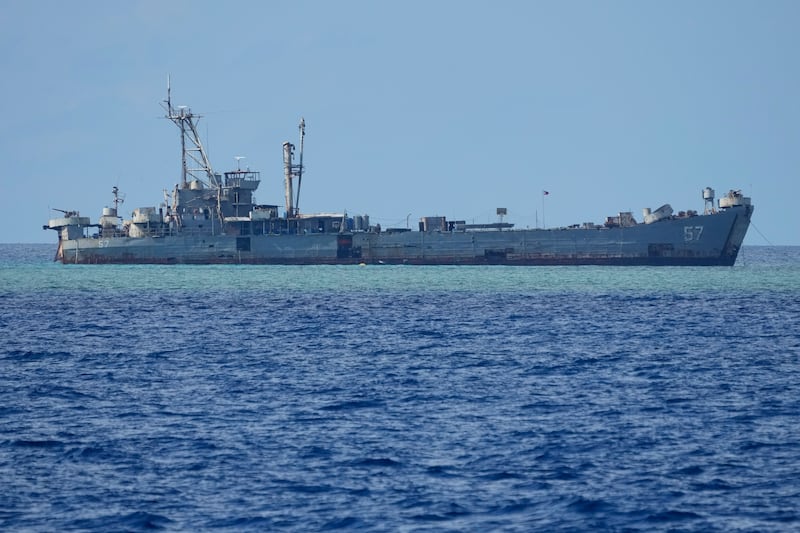Philippine President Ferdinand Marcos Jr.’s top security official on Friday demanded the expulsion of Chinese diplomats who allegedly recorded a conversation about Filipino military resupply missions to a disputed shoal.
National Security Adviser Eduardo Año called on the foreign office here to expel staffers at China's embassy in Manila whom the Philippine government suspects of having illegally recorded a telephone call between a Chinese official and a senior Filipino military official.
During the phone conversation, the officials allegedly discussed some kind of notification arrangement between China and the Philippines for Filipino resupply missions to Second Thomas (Ayungin) Shoal in the South China Sea.
“The Chinese Embassy’s repeated acts of engaging in and dissemination of disinformation, misinformation, and mal-information – now releasing spurious transcripts or recordings of purported conversations between officials of the host country – should not be allowed to pass unsanctioned or without serious penalty,” Año said in a statement Friday.
Mal-information refers to "information that is based on reality, but used to inflict harm on a person, organization or country," according to a 2018 publication by UNESCO.
Año was criticizing the embassy for releasing a transcript of the alleged conversation to select Philippine media outlets.
The “unmistakable objective” of the embassy’s decision to release the transcript, he said, was to “sow discord, division and disunity between and among the Filipino people.”
He also accused China of spreading “falsehoods and smears” by claiming that Vice Adm. Alberto Carlos, head of the Philippine military’s Western Command (WESCOM), had agreed during the phone call to a “new model” for such resupply missions.
“Without a doubt, these are serious breaches of the basic norms of international relations and diplomacy by the embassy,” Año said. “Those individuals in the Chinese Embassy responsible for violating Philippine laws and the Vienna Convention on Diplomatic Relations and those responsible for these malign influence and interference operations must be removed from the country.”
Some tense standoffs at sea have occurred in recent months as China Coast Guard ships have harassed Philippine supply boats and tried to block them from sailing on to a Filipino military outpost at Second Thomas Shoal. The shoal lies within Manila's exclusive economic zone but is also claimed by Beijing.
It was not immediately clear from Año’s statement if Philippine officials had verified if the alleged phone call actually happened. The Chinese embassy, for its part, has neither confirmed or denied news reports that the alleged conversation was tape-recorded.
The Philippines’ anti-wiretapping law prohibits the unauthorized wiretapping and secret recording of private communications to protect the privacy rights of individuals.
Earlier this week, Philippine officials announced that Carlos had gone on leave and was temporarily replaced.
The military did not release details of his whereabouts. WESCOM oversees the country’s defense of the Palawan and Kalayaan islands, including the disputed Spratly chain.

In Beijing on Friday, the Chinese foreign ministry hit back in response to Año’s statement.
"The Philippines' response shows exactly their guilty conscience in the face of facts and evidence and how exasperated and desperate they have become," ministry spokesperson Lin Jian said during a regular press conference.
“We ask the Philippines to ensure that Chinese diplomats can carry out their duty normally, and to stop provocations and infringements,” he said. “The Philippines needs to quit denying the facts and must not make reckless moves that will only backfire on the Philippines itself.”
Año was the latest Philippine security official to demand that Manila come down hard on the Chinese embassy. Defense Secretary Gilberto Teodoro Jr. had earlier warned that, if proven true, those involved in recording the alleged phone conversation should be expelled from the Philippines.
‘Deception’
Filipino maritime law expert Jay Batongbacal said that the alleged conversation, if it had actually happened, showed Beijing’s strategy in the South China Sea dispute.
“This [alleged phone conversation] is just the latest in a string of attempts on their part to put up these so-called arrangements, which are always secret or verbal or non-binding. And then trying to tell the national government they should abide by these secret, unofficial agreements,” Professor Jay Batongbacal, director of the University of the Philippines Institute for Maritime Affairs and Law of the Sea, said during a TV interview on Wednesday.
"There's an element of not just subversion, but also deception involved. And no sincere and properly-acting country should be doing this," Batongbacal told the ABS-CBN news program " Top Story."
“Deception should not be an instrument of statecraft and diplomacy.”
Balikatan drills end
The controversy broke out in the last week of joint large-scale military drills between the United States and the Philippines. Washington has backed and reaffirmed its support for Manila over the South China Sea dispute.
The Philippines-U.S. drills, called Balikatan (or shoulder-to-shoulder) Exercises, officially ended Friday, marking the culmination of what the allies said was the most comprehensive iteration of the annual exercises yet.
This year’s drills saw over 16,000 troops from both sides, as well as observers from Australia, France, and other countries.
There were wide-ranging activities held across the country, but the highlight was this week’s beach defense drills that saw troops repel an imagined foreign force from taking over a beach in Laoag, a city in the northern Philippines facing Taiwan.

As Balikatan came to close, Defense Secretary Teodoro Jr. said his department would continuously increase the pressure on the military “for them to evolve as soon as possible into a multi-threat, multi-theater operating armed force, consistent with the archipelagic doctrine nature of our country and the necessity for defending it in a proactive and not a passive manner.”
“We welcome more multilateral and maritime cooperative activities,” he said, as he expressed thanks to the foreign governments “who will continue to welcome us because our national right, territorial integrity, and dignity are non-negotiables for each and every Filipino.”
